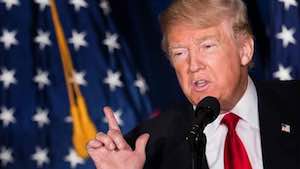By Matthew Vadum ——Bio and Archives--April 28, 2016
American Politics, News | CFP Comments | Reader Friendly | Subscribe | Email Us
 Republican presidential frontrunner Donald Trump vowed to undo the many foreign policy and national security failures of President Obama, along with the persistent sense of American impotence in the face of international challenges, in an important, muscular speech yesterday, outlining what a Trump administration would do in office.
A one-man wrecking crew who has been demolishing politically-correct pieties since he launched his campaign last year with a call to arms against illegal immigration, Trump announced that the foreign policy administered by Barack Obama, Hillary Clinton, and John Kerry that has emboldened Islamic terror has been catastrophic not just for America but for the whole world.
Republican presidential frontrunner Donald Trump vowed to undo the many foreign policy and national security failures of President Obama, along with the persistent sense of American impotence in the face of international challenges, in an important, muscular speech yesterday, outlining what a Trump administration would do in office.
A one-man wrecking crew who has been demolishing politically-correct pieties since he launched his campaign last year with a call to arms against illegal immigration, Trump announced that the foreign policy administered by Barack Obama, Hillary Clinton, and John Kerry that has emboldened Islamic terror has been catastrophic not just for America but for the whole world."There are scores of recent migrants inside our borders charged with terrorism. For every case known to the public, there are dozens and dozens more. We must stop importing extremism through senseless immigration policies. We have no idea where these people are coming from. There's no documentation, There's no paperwork. There's nothing. We have to be smart. We have to be vigilant."Trump also had a simple message for the Islamic State, stressing the importance of deception against the enemy in conflict, a tactic clearly missing in Obama's foreign policy:
"Their days are numbered. I won't tell them where and I won't tell them how. We must as a nation be more unpredictable. We are totally predictable. We tell everything. We're sending troops. We tell them. We're sending something else. We have a news conference. We have to be unpredictable. And we have to be unpredictable starting now. But they're going to be gone. ISIS will be gone if I'm elected president. And they'll be gone quickly."
Support Canada Free Press

"a humanitarian nation, but the legacy of the Obama-Clinton interventions will be weakness, confusion, and disarray. A mess. We've made the Middle East more unstable and chaotic than ever before. We left Christians subject to intense persecution and even genocide. We have done nothing to help the Christians, nothing, and we should always be ashamed for that, for that lack of action."Trump also criticized the "dangerous" neo-conservative effort to democratize the world, and argued for a kind of old-fashioned conservatism, seemingly for modest foreign policy goals and stability. “We are getting out of the nation-building business, and instead focusing on creating stability in the world,” he said. The reassuring clarifications that Trump offered about his foreign policy views should be a step towards satisfying some of his conservative critics. The speech was a strong beginning in that direction but it also contained some statements that would definitely concern a portion of the conservative camp. Trump, for instance, suggested that the U.S. should be prepared to exit NATO, the North Atlantic Treaty Organization. Many conservatives wouldn't see a problem with pointing out NATO's problems and how America is being taken advantage of by member nations that aren't paying their fair share, but they would certainly question how threatening the end of NATO complements Trump's objective of making America a strong military presence in the world. NATO has been a key element of global security and it is usually isolationists and leftists, not conservatives, who want to abolish NATO. Trump also continued to preach the gospel of economic nationalism, with its tariffs and trade wars that many conservatives would argue benefit entrenched interests while soaking American consumers and generating economic depressions and recessions. He spoke of "the theft of American jobs" and characterized NAFTA, the North American Free Trade Agreement, as "a total disaster for the United States." He also struck a familiar refrain complaining about the loss of manufacturing jobs in states like Pennsylvania and New York, which many conservatives would argue were lost not because some big, mean bully took them away, but because manufacturing tends not to be a cost-effective endeavor in the U.S. Trump's address comes after his big night Tuesday in which he decisively won Republican primaries in Connecticut, Delaware, Maryland, Pennsylvania, and Rhode Island. He now has 987 of the 1,237 delegates he needs for a first-ballot victory at this summer's GOP nominating convention in Cleveland, according to Real Clear Politics (at time of this writing). His rivals are far behind with Ted Cruz at 562, John Kasich at 153, and Marco Rubio, who suspended his campaign, at 171 delegates. And Trump's support among many Republican voters appears to be solidifying. According to the NBC News/Survey Monkey weekly tracking poll unveiled Tuesday, Trump now enjoys 50 percent support among Republicans and Republican-leaners nationally for the first time since the poll was launched in December. Cruz and Kasich are both well behind the New York businessman with 26 percent and 17 percent, respectively. Time will tell if Donald Trump succeeds in his present ambition and will, eventually, stand the test of implementing the foreign policy he has proposed for America.
View Comments
Matthew Vadum, matthewvadum.blogspot.com, is an investigative reporter.
His new book Subversion Inc. can be bought at Amazon.com (US), Amazon.ca (Canada)
Visit the Subversion Inc. Facebook page. Follow me on Twitter.